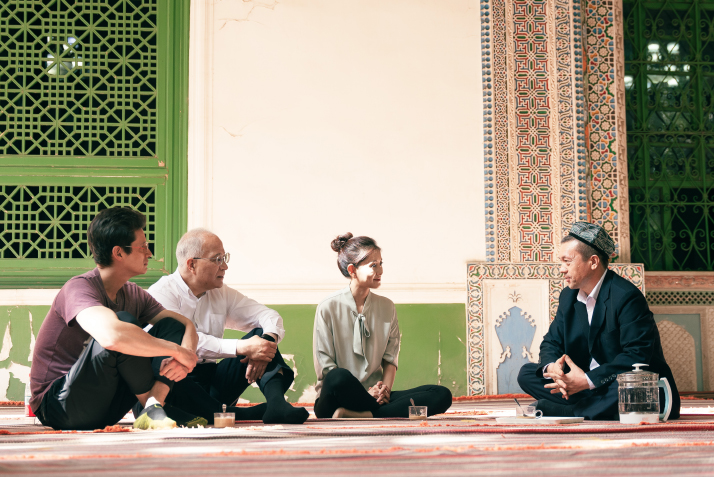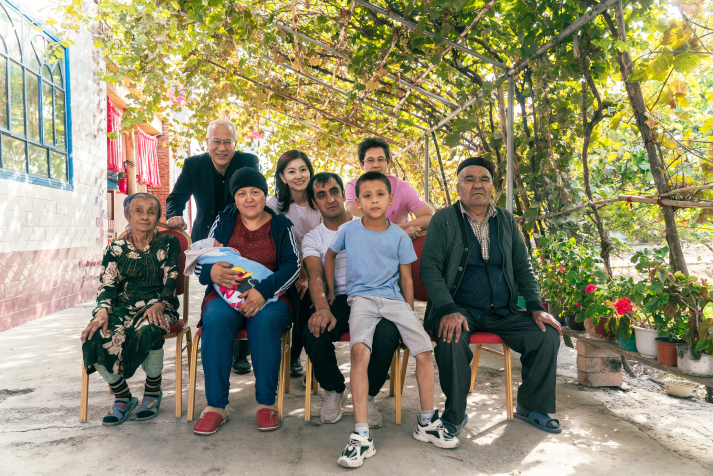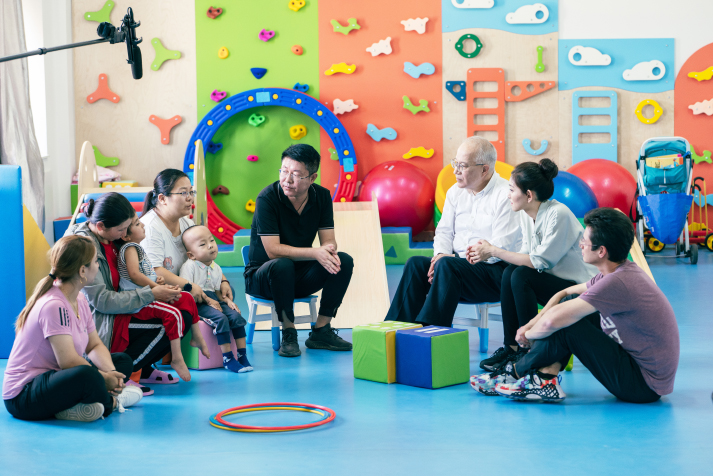
Einar Tangen (second left) interviews an imam at the Id Kah Mosque for a documentary titled Inside China produced by Miao Xiaojuan Studio, Xinhua News Agency, in Kashi (Kashgar) Prefecture on September 17, 2021 (XINHUA)
In September 2021, I traveled to Xinjiang for the second time, the first being in 2014, in the midst of turmoil due to separatists, to observe and comment on people's views on democracy, freedom and human rights.
Democracy, freedom and human rights are topical for me because, as a political and economic affairs commentator on numerous international TV and radio stations, I experience the daily anti-China narratives on everything from politics, economics and trade, to Xinjiang, Hong Kong, Xizang, Taiwan and the South China Sea.
Given much of the developed world's press has made up their minds, it made sense to me to see what people in China thought about their government, and their lives, in terms of their aspirations, rights, responsibilities and the law.

Tangen and crew members of the Miao Xiaojuan Studio pose with a family in Kashi Prefecture on September 21, 2021 (XINHUA)
Direct dialogue
I was able to talk to people and we didn't talk to the people that the local government wanted us to talk to. We talked to people straight off the street. We even followed somebody home from the maternity hospital.
The proud parents had two sons but longed for a daughter. Both were only intermittently employed and lived with the husband's family. They had paid 320 yuan ($50) for the entire delivery process at a newly opened hospital. The smile on the proud grandfather's face and the looks of his shy but inquisitive grandsons as they greeted the newest addition to the family, a granddaughter, is something that will remain inscribed in my mind.
It also debunked the false narratives about an area and people in fear, where mothers are forced to have abortions, where daughters are unwanted and where people are locked up, tortured and killed in "concentration camps."
We went to their home twice, once in the evening and once more during the day, to record the family's joy when the "gift," which is what they named her in Uygur, came home for the first time.
There were other activities in the towns and cities of Xinjiang, but they all spoke to the same thing: It was about Chinese people going about their daily lives, working, playing and pursuing their dreams.
The 20 hours I spent traveling through Kashi (Kashgar), where most residents are Uygur, revealed a normal community where children played in the lanes, the corn was dried on the roads, and people went about their lives, not consumed by fear, but with a desire to improve their families' futures—a depiction, which is not just the story of Kashi or Xinjiang, but all of China.
While I have not given up on rebutting the nonsensical narratives created to villainize China, as part of a geopolitical rivalry to contain its success, I know that there is little I, or anyone else, could say that would change some minds. see the truth.
There were many other interviews and experiences that stood out, such as talking to the imam of the Id Kah Mosque, Kashi's largest mosque, whose father, the previous imam, was brutally butchered by three terrorists just outside the north gate of his mosque in 2014.
I also interviewed a man, and then a woman, who, through their respective families, went to the vocational education and training centers to learn standard Chinese, new skills and tolerance. The centers were set up to contain and remedy the dissemination of religious extremism and frequent terrorist incidents. All trainees had graduated by October 2019.
I saw the love between the man and his wife who had recovered their relationship after he entered a training center at his wife's urging, after a number of domestic issues and unreasonable demands that she quit her job, wear a burka and stay at home.
Then there was the woman who was pushed by her family to get help at a training center after her father passed away. She had been convinced by an acquaintance that unless she stopped working and embraced the Wahhabist version of Sharia (Islamic law), her father would go to hell.
She had been a kindergarten teacher, and at the training center, her talent as a performer was recognized and she is now the star of the daily show that welcomes tourists to the ancient city of Kashi. In talking to her, one could not help noticing that it was as if she was talking about a different person when she told the story of her past.

Tangen interviews mothers of children with disabilities for Inside China in Kashi Prefecture on September 17, 2021 (XINHUA)
Community-level elections
In terms of the people we talked to, about 50 percent were random people we stopped and asked questions of. How are things going for you? Is the local government doing a good job? Do you know who the government leaders are? Based on their answers, we would ask follow-up questions.
What became clear was that people's minds were not on politics but the realities of their lives, economic opportunity, access to medical care and their families. It was noticeable that in every interview of the Chinese citizens, there was a quiet pride in their country and government.
Wherever we went, the local governments seemed determined to address issues, not as a reaction to outside criticisms, but as part of what they saw as their work.
We watched local election preparations and then watched as people cast their secret ballots for the people they wanted to represent them. We talked to five candidates who were competing for four positions on the village board. Noticeably, no candidate made election promises or attacked the other candidates. Each just talked about what they had done and their desire to serve.
We then walked around the village and asked random people if they knew the candidates, to which they all answered "yes." We asked why these people had been elected, to which they replied, "People know who they are, and we believe they have the desire and ability to help the village." I noted there weren't any election posters or yard signs.
When I asked why, the answer I got was: People don't do that, and it wouldn't do any good because if people did not know the people running and their characters, they would not vote for them.
Changes
Traveling through areas, some of which were new and others that I had visited seven years prior, there was a sense of profound environmental and social change.
Environmentally, the lush green landscapes and prosperous villages I saw were a far cry from the industrial dust bowls and old, cheaply constructed homes that surrounded them, which I had seen in the past.
Socially, there were two major changes I noted. First, the attitudes and aspirations of the people we interviewed were the same as the middle-class attitudes and aspirations of those in the developed world: making money to pay for their children's university educations, vacations, cars, houses, savings, access to good medical care and how to take care of their elders. Second was the level and scope of local and national governments in promoting social development.
Having traveled in China extensively over the last 20 years, including writing two books on Chinese cities and how they work, it was incredible to see the pace of change over a relatively short period of time and how it has changed people's thinking and expectations. My journey covered only a fraction of China, but what I saw indicates that the China's success will continue.
The author is a senior fellow at the Center for International Business Ethics at the University of International Business and Economics, founding partner of the Center for China and the World at City University of Macau, and senior fellow at the Beijing-based Taihe Institute. He is also an independent economic and political affairs commentator.


